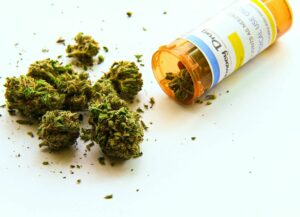Heroin Addiction: A Massive Epidemic
An opioid epidemic, which includes both over the counter opioids and other opioid derivatives like heroin, has swept across the country in recent years and is now at the top of the list of problems to solve for many states and the federal government. An astounding statistic has been uncovered as well; 80% of patients using heroin reported mis-using over the counter opioids prior to becoming addicted to heroin. Traditional approaches to heroin addiction in rehabilitation centers include behavioral therapies and a variety of medications, which often do not prevent the high number of relapses.
FOLLOW US ON FACEBOOK & INSTAGRAM
Prescription medications are an integral part of heroin addiction treatment in traditional rehabilitation centers. Medications like methadone and buprenorphine help with withdrawals and cravings and naltrexone helps block opioid receptors. Cannabis is now seen as a possible replacement for the harsher medications that ease people off heroin by reducing withdrawal symptoms and helping people control underlying conditions that brought them to use opioids in the first place.
Cannabis Used to Treat Opioid Addiction Successfully
A 2014 study published in the journal JAMA found a 25% drop in opioid overdose deaths in states that have legalized medical marijuana. The study looked at all 50 states between the years 1999 and 2010 and showed great promise for the ability of cannabis to become an alternative to opioids.
RELATED: MARIJUANA DOES NOT CAUSE OPIOID ADDICTION
Some doctors are now looking at how cannabis could help their patients who are addicted to opioids. Dr. Gary Witman, of CannaCare Docs in New England became one of the first to widely publicize the idea of using cannabis to help people with opioid addictions. The Massachusetts clinic where Dr. Witman is employed has treated 80 patients who suffer from pharmaceutical addictions. The one-month rehabilitation program proved successful for 75% of the patients in the study.
CBD a Preventative Key
Though the evidence in the study conducted by Witman is only anecdotal, and looked at pharmaceutical opioids instead of heroin, it does demonstrate that cannabis may be able to help people find relief from their addictions. A rat modeled study from 2009 that was published in the Journal of Neuroscience looked at the effects of CBD on heroin self administration and drug seeking behavior. Rats who were self dosing heroin, through a signaling system that prompted them to release heroin by pressing a button, did not stop heroin usage when given CBD (cannabidiol).
What is remarkable however, is that rats who were in active recovery from heroin for two weeks and were dosed CBD, did not seek heroin when they were signaled. The study’s researchers concluded that,“CBD may be a potential treatment for heroin craving and relapse.” Though the study was rat modeled and very preliminary, it does show that cannabis has great promise as a treatment for heroin addiction.
The Endocannabinoid System and Addiction
THC also has the potential to help people with withdrawal symptoms as people are recovering from heroin addiction. The endocannabinoid system is strongly linked with the way opioids are processed and how they signal dependence. A study from Drug and Alcohol Dependence in 2015 looked at the effects of Dronabinol, a synthetic form of THC, on the severity of opioid withdrawals. The study found that, “Dronabinol reduced the severity of opiate withdrawal during acute detoxification”. Since THC interacts with the body in the same way as Dronabinol, cannabis may also be extremely effective at helping decrease the severity of withdrawal symptoms for patients.
Though there are some gaps in professional research on the issue of cannabis being used to help people with heroin addiction, cannabis may be an extremely effective alternative to the medications already used to help people rid themselves of heroin addiction. Not to mention, cannabis has a great potential to replace the need for opioids because of its potent analgesic qualities. Though some researchers are skeptical of the possibility of cannabis as an effective part of heroin addiction treatment, a new treatment center in Los Angeles is now capitalizing on the idea.
Cannabis has no Lethal Dose
The High Sobriety treatment center focuses on “cannabis inclusive treatment” for people with all kinds of addictions, ranging from alcohol to heroin. High sobriety helps people detox from harsh drugs with the alternative of cannabis. High Sobriety describes their goal as to, “eliminate the risk of death from drug use.
Cocaine, heroin, methamphetamine, pharmaceuticals and other street drugs all have a lethal dose. Leading the death toll though, and killing more than all others combined, is alcohol. Cannabis has no known lethal dose. There is a simple truth; eliminating drugs with a lethal dose and using a drug with no lethal dose is a massive improvement, and will save lives. For generations we have been told that cannabis is a “gateway” drug, at High Sobriety, we believe it is an exit drug.”
A Controversial Subject
The center was founded by Joe Schrank, a recovered addict and drug treatment counselor who has worked at many different treatment centers throughout his life. Though the idea of using cannabis at a treatment center is still controversial, the center believes that cannabis can aid people with detoxification and can be an integral part of recovery.
Joe Shrank says, “Our cannabis replacement protocol is in full compliance with law and under medical supervision. Cannabis is used for a variety of medical conditions as both treatment and symptomatic care. Cannabis can aid in the detox process, helping with discomfort, insomnia, and flu-like symptoms associated with the withdrawal process, reducing or eliminating the need for other drugs. After the initial detox, our doctor will provide a comprehensive and collaborative evaluation to determine an individual’s goals for recovery. The determination of how cannabis is used is ultimately made by the doctor, like any other medication. Post detox, cannabis continues to be an option under medical supervision.”
High Sobriety will become an interesting study for how cannabis could aid people with a variety of addictions, including addictions to heroin, which are becoming an increasingly larger problem across the country and world. The detoxification potential of cannabis should not be ignored and hopefully all of the new information on the issue will prompt more studies that could potentially lead to life saving information for millions of people.
If you are new to cannabis and want to learn more, take a look at our Cannabis 101 post. HelloMD can help you get your medical marijuana recommendation; it’s 100% online, private and efficient.






